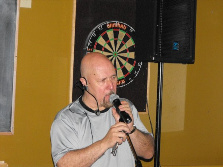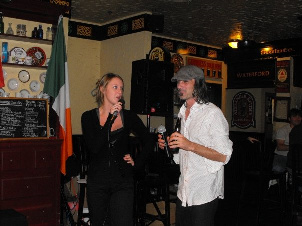IMPROVING YOUR KARAOKE EXPERIENCE
Before we start let’s make one thing clear. Karaoke is a wonderful opportunity for someone who always wanted to sing to do just that. As an entertainer for the past 48 years there is still nothing better for me than to sing a great song to a receptive audience and then knock their collective socks off! Karaoke will give you the chance to be the star you always wanted to be WITHOUT the struggle and sometimes heartache that a career in the entertainment industry can be. Go out and sing with all the joy and pleasure you can and I assure you that you will pass that joy and pleasure on to all who listen, no matter what your level of skill and/or talent. What I am going to be discussing here is not how to sing, or the myriad techniques that a good vocal coach can provide: Ya don’t need it! I’m sure that you are already aware that the majority of the singers you enjoy and admire have had no such training either. So sure there are a few tips I’ll give here to help you maximize the abilities you already have but in the main I’m talking about simply helping you to improve you karaoke experience so you (and your audience) get more out of it. Let’s face it, if you want to be a professional singer you would be pursuing other avenues than karaoke to do it right? So let’s just enjoy ourselves!! Have you ever noticed that a few singers induce a collective gasp and immediate applause when they start singing? This is what we are aiming at for YOU! Let’s take a look at a few essentials then:
Finding the right host
Easier than it sounds, especially given the sheer number of KJs and venues available today. Unfortunately the level of skill and experience is just as varied, so ask! You don’t need to know what equipment they are using, you’ll know whether it sounds good the first time you hear it. You might be more interested in; how long have they been in the business, what their background is etc. Obviously someone who used to be a short order cook will have a lot less knowledge that someone who has been in the entertainment industry for a long time. Most of us love to brag so don’t be afraid to ask. Take a look at the way the rotation works. Well all seem to have our own ideas about this but the ultimate goal should be to get as many singers singing as possible. Again if you don’t get it – ask. People often ask me if I have special equipment “because it sounds so good.” This gives me the chance to brag and tell them, “No, I just know how to use it, having been a recording engineer and producer for the last 30 years or so.” I know several other hosts and friends that can say the same kind of thing. You WILL notice the difference.


Finding the right songs:
Ah, now it gets interesting. Who do you think you sound like? Unlike the professional, who is striving to sound completely unique, the karaoke singer will create the greatest impact by at least coming close to the artist whose song he is singing. This is by no means an absolute but it is a good start. Let’s say you are a male, with a voice a little like Garth Brooks or Roger Miller for example but your favourite band is Queen. Does it make sense that you struggle to sound like Freddie Mercury (which you can’t) or seek other material that gives you the feel of Queen but in a vocal range you can actually handle? I have often said that the only people who want to sing Bohemian Rhapsody CAN’T while those that can WON’T. I’m joking but I think you get what I intend. If you choose your songs carefully so that they suit you and what you are trying to project you have taken a huge step towards the “Ahhh” factor. You might also bear in mind that you host can usually alter the key of the song to accommodate your vocal range, and if you are a regular he knows he will certainly be able to make some suggestion as to songs that might suit you. Try and chat to him when he’s not working tho’ – if he has time to talk to you while someone else is singing he’s not doing his job right.
Practice:
That’s right, I said practice! Listen to the original versions of the songs you choose until they’re completely memorized – that means learn the words so you don’t need to look at the screen. It is very difficult to interpret the meaning of the lyrics of a song if you are reading them. Making good eye contact with your audience is another step towards the “Aahh” factor, and you can’t do that if you are reading the words off the monitor. If eye contact is hard for you or makes you nervous simply make eye contact with someone you know rather than a stranger, then ignore all others. You can also pick a spot above and behind the audience. This will ease any potential stage fright or jitters AND they’ll all think you are singing just to them! You’re there to have fun, not make yourself a nervous wreck! The Monitor Screen: Of course you are going to need to use the screen on occasions. How else will you try out new songs to see if they suit you? If you do use it, bear in mind that the screen provides a few useful clues that will help you perform better. Most critical is the timing of the lyrics. In almost all cases the lyric of the song are highlighted to show you WHEN to sing the individual words. “When it changes colour is when you sing the word.” (I do say that a lot ya know.)
Pitch:
Pitch is also referred to as “Key”, and means that music and the singer are in the same place on the musical scale. Rule number one: LISTEN to the music! Only 1 person in 1000 cannot hear when he/she is off key. Most will recognize that there is something “wrong” as long as they listen to what is happening. Most mistakes will be flats, or singing below the pitch of the music and happens to everyone. The cure for this is to be seen above: PRACTICE! I know of some who sings the whole song in the wrong key, and people will tend to make cracks about how bad a singer that was – wrong! All that happened is that the singer wasn’t hearing the music properly, but nevertheless sang the whole song in a consistent pitch albeit incorrect. Again a little practice will cure this as well.

Microphone technique:
Ask your host how best to use the microphone and then trust him/her to get you the best sound possible. Each microphone is different had have their own qualities. Some are very good at rejecting “feedback” and others less so. Feedback happens when the microphone picks up and amplifies its own signal from the speakers, then sends it BACK to the speakers and amplifies THAT signal and so on and so on. We all know what that sounds like: that ear-piercing scream kills flying insects and small mammals.
If it’s happening to you here are some do’s and don’ts:
- Don’t point the microphone at the speaker.
- Don’t cover the ball with your hand at any time – even if it looks “cool.” Do point the microphone directly at your mouth – that’s where the microphone is designed to work best. If you sing into it like you are licking an ice cream you only get half the sound. Do move backwards so the microphone gets to a point where it is behind or level with the speaker.
- Do use your body as a shield between the speaker and the microphone – you don’t have to clutch it to your chest, just place your body mass between the mike and speaker. Most modern microphones are designed to minimize feedback and so have a “near field” pickup range. What this means to you is that you should keep the microphone very close to your mouth while singing. I know we see all the old pro’s moving the microphone away from the mouths when singing louder notes but there are two factors in play here: One is that the microphone is designed NOT to pickup from a distance, so all of the fine, powerful high notes will not be heard by anyone but you. Two is the fact that the people you saw using this technique invariably possessed a very powerful voice to begin with. This much projection is a rarity so play safe, let us hear all you have to sing and keep the microphone close to your lips and let the host take care of the sound. If he can’t or won’t – maybe you should look for another host.
Recording:
It is becoming more common for your host to offer recording opportunities for you to take advantage of. Some are using Video while others Audio; in some cases both are available. Take advantage of these services. There is no greater learning tool that will advance you quicker than to be able to review your performances. Bear in mind that you will never be satisfied (it’s not in our nature) but there is so much to learn by simply correcting your mistakes as you see them. Incidentally with very few exceptions recording is a free service the host offers to enhance your karaoke experience. In my opinion this would be worth the cost of a small fee if that is what your host is doing. There is a lot of work involved and not all of us have the time to maintain the kind of library that I do for example. (Over 1800 videos on file and 800+ audio files)
Well I hope I’ve helped you to get a little more enjoyment out of your karaoke experience and look forward to seeing you sometime so you can
“Come Sing For Us!”
Tom Heyfron Justme Productions